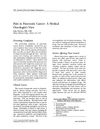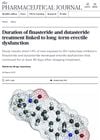 December 2006 in “The Brown University Psychopharmacology Update”
December 2006 in “The Brown University Psychopharmacology Update” Second-generation antipsychotics offer no significant benefit over first-generation ones for schizophrenia.
 July 1993 in “Inpharma Weekly”
July 1993 in “Inpharma Weekly” Dicentrine reduced heart disease risk factors in rats, T-588 protected mice brains without side effects, Provir blocked herpes virus and lessened mouse symptoms, and LY191704 could treat hair loss and prostate issues.

Amphetamine use may not cause hair loss, "geezer" traits are normal aging, not all educated older people are stereotypes, and metronidazole can rarely cause lung disease.
 January 1988 in “Journal of Pain and Symptom Management”
January 1988 in “Journal of Pain and Symptom Management” Pancreatic cancer pain management is inadequate due to the disease's severity and limited effectiveness of treatments.
 February 1977 in “Archives of Dermatology”
February 1977 in “Archives of Dermatology” Topical mitotic blocking agents like colchicine can be dangerous and potentially fatal, and hair loss from rapid weight loss is due to low protein, not the speed of weight loss.
 June 1982 in “Reactions (Auckland)”
June 1982 in “Reactions (Auckland)” Metoprolol and propranolol may cause hair loss.
January 2022 in “DOAJ (DOAJ: Directory of Open Access Journals)” Androgenetic alopecia is common, affects self-image, and has no complete cure yet.
Androgenetic alopecia is more common in male Chinese adolescents and linked to rosacea, but doesn't affect quality of life.
August 2019 in “Chin J Naut Med & Hyperbar Med” Hyperbaric oxygen therapy improves hair growth and quality of life in androgenic alopecia patients.
 January 2017 in “Clinical pharmacist”
January 2017 in “Clinical pharmacist” Long use of finasteride and dutasteride can cause long-term erection problems.

Male androgenetic alopecia (MAA) is a common, hereditary hair loss condition in men, linked to heart disease, and can be treated with minoxidil, finasteride, or hair transplantation.
 336 citations,
August 2015 in “European Journal of Epidemiology”
336 citations,
August 2015 in “European Journal of Epidemiology” The Rotterdam Study found risk factors for elderly diseases, links between lifestyle and genetics with health conditions, and aimed to explore new areas like DNA methylation and sensory input effects on brain function.
 247 citations,
August 2011 in “European Journal of Epidemiology”
247 citations,
August 2011 in “European Journal of Epidemiology” The Rotterdam Study updated its design and objectives in 2012, providing insights into various diseases in the elderly, including skin cancer, bone health, liver disease, neurological and psychiatric conditions, and respiratory issues.
 47 citations,
August 2005 in “Facial Plastic Surgery Clinics of North America”
47 citations,
August 2005 in “Facial Plastic Surgery Clinics of North America” Face-lifts can lead to complications like bleeding, nerve injury, skin death, hair loss, and rare infections, with careful surgery reducing risks.
 23 citations,
January 2001 in “International journal of toxicology”
23 citations,
January 2001 in “International journal of toxicology” St. John's Wort extract and oil safety in cosmetics is unclear; more data needed on photosensitization, toxicity, and human irritation.
 18 citations,
June 2019 in “Clinical research in dermatology”
18 citations,
June 2019 in “Clinical research in dermatology” Acne can't be cured but can be managed with treatments like benzoyl peroxide and diet changes; it's costly and can lead to scarring and mental health issues.
 7 citations,
January 2022 in “Evidence-based complementary and alternative medicine”
7 citations,
January 2022 in “Evidence-based complementary and alternative medicine” Ginger supplements helped reduce symptoms and improve metabolic health in hypothyroid patients.
 2 citations,
January 1997 in “Principles of Medical Biology”
2 citations,
January 1997 in “Principles of Medical Biology” Drug metabolism affects how long a drug works, its interactions, activation, and toxicity, and is influenced by genetics, diet, illness, and other drugs.
 1 citations,
May 2022 in “IntechOpen eBooks”
1 citations,
May 2022 in “IntechOpen eBooks” Obesity leads to physical, metabolic, reproductive issues, higher healthcare costs, and mental health problems.
 1 citations,
January 2015 in “Side effects of drugs annual”
1 citations,
January 2015 in “Side effects of drugs annual” The document concludes that various dermatological treatments and drugs can cause skin reactions and side effects.
 1 citations,
January 2009 in “Elsevier eBooks”
1 citations,
January 2009 in “Elsevier eBooks” Anorexia Nervosa and Bulimia Nervosa are complex eating disorders with increasing incidence among young females, significant morbidity, and varying mortality rates, requiring more research for better treatment.
 September 2024 in “PubMed”
September 2024 in “PubMed” Hair loss can be treated based on its type and cause, improving quality of life.
 February 2024 in “Journal of Education, Health and Sport”
February 2024 in “Journal of Education, Health and Sport” Different treatments for PCOS should be tailored to the individual, including lifestyle changes and various medications.
 April 2023 in “Journal of Investigative Dermatology”
April 2023 in “Journal of Investigative Dermatology” People with Lichen sclerosus are more likely to have skin conditions like vitiligo and alopecia areata, heart disease risks, and other health issues. They should be checked for these, but screening plans shouldn't differ based on gender due to lack of data.
 October 2022 in “Dermatology practical & conceptual”
October 2022 in “Dermatology practical & conceptual” Most injecting drug users in the study had hepatitis C and skin problems, which moderately affected their quality of life.
 May 2021 in “Journal of the Endocrine Society”
May 2021 in “Journal of the Endocrine Society” The 18-year-old girl likely has a condition called müllerian agenesis, which caused her to not have a uterus and experience no menstrual periods.
 March 2014 in “Hair transplant forum international”
March 2014 in “Hair transplant forum international” Hair transplant surgeons should also focus on their patients' overall health, including regular check-ups and screening for common health issues.
 10 citations,
March 2016 in “The Journal of Obstetrics and Gynecology of India”
10 citations,
March 2016 in “The Journal of Obstetrics and Gynecology of India” The article suggests renaming Polycystic Ovarian Syndrome (PCOS) to "Hyperandrogenic Persistent Ovulatory Dysfunction Syndrome" (HA-PODS) for accuracy and consistency, but no final decision was made.
 2 citations,
August 2021 in “Revista Da Associacao Medica Brasileira”
2 citations,
August 2021 in “Revista Da Associacao Medica Brasileira” The COVID-19 pandemic has increased hair loss and psychological distress in women.
 January 2015 in “Вестник дерматологии и венерологии”
January 2015 in “Вестник дерматологии и венерологии” Patients with non-scarring hair loss often have emotional disorders.



























